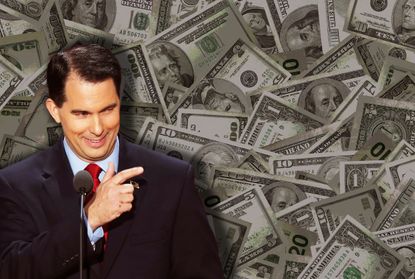In a Citizens United world, we should at least know who is buying our politicians
Scott Walker shows that the rich these days buy their influence anonymously


In 1899, an ultra-wealthy Montana copper magnate named William Clark wanted to be one of the state's U.S. senators. In those days, senators were elected by state legislatures, so Clark tried a straightforward tactic: mass bribery. He gave $10,000 to every legislator who would take it, which worked like a charm. Unfortunately for Clark, the Senate got wind of this, and refused to seat him. He resigned, though he tried again without the overt bribery and won in 1901, when he served a full term.
Mark Twain wrote of Sen. Clark: "He is said to have bought legislatures and judges as other men buy food and raiment. By his example he has so excused and so sweetened corruption that in Montana it no longer has an offensive smell. His history is known to everybody; he is as rotten a human being as can be found anywhere under the flag..."
Such stories inspired some of the original reforms against organized money in politics. Indeed, Clark was almost singlehandedly responsible for the direct elections of senators.
Subscribe to The Week
Escape your echo chamber. Get the facts behind the news, plus analysis from multiple perspectives.

Sign up for The Week's Free Newsletters
From our morning news briefing to a weekly Good News Newsletter, get the best of The Week delivered directly to your inbox.
From our morning news briefing to a weekly Good News Newsletter, get the best of The Week delivered directly to your inbox.
But we should not be too self-righteous when it comes poor old William Clark. Not only is the problem of political corruption fast returning to its Gilded Age nadir, in some respects it is actually worse than in Twain's day. Then as now, our political system is essentially owned outright by the wealthy. But today we have allowed them to hide their identities behind legal chicanery.
Removing the money from politics altogether is a worthy goal. But until then, simple transparency about who is buying which politician would be an excellent stopgap measure.
It was Supreme Court Justice Anthony Kennedy who wrote the Citizens United decision, which abolished limits on independent political spending by unions and corporations and sparked a stupendous growth in shadowy nonprofits allied with various parties and candidates. The decision's most famous line is this: "Independent expenditures do not lead to, or create the appearance of, quid pro quo corruption."
I would like to direct Justice Kennedy's attention to this story by Michael Isikoff, about a Wisconsin hardware store magnate named John Menard, Jr. When Menard wanted to help Gov. Scott Walker (R) defeat a hard-fought recall attempt in 2012, post-Citizens United groups were a handy weapon of choice — especially 501(c)(4) nonprofits, which do not have to disclose their donors:
He wrote more than $1.5 million in checks to a pro-Walker political advocacy group that pledged to keep its donors secret, three sources directly familiar with the transactions told Yahoo News.Menard’s previously unreported six-figure contributions to the Wisconsin Club for Growth...seem to have paid off for the businessman and his company. In the past two years, Menard’s company has been awarded up to $1.8 million in special tax credits from a state economic development corporation that Walker chairs, according to state records. [Yahoo News]
According to Isikoff, Menard has also benefited from regulatory laxity under the Walker regime — the Wisconsin government had previously levied stiff fines against him and his company for "illegally dumping hazardous waste." In a telling coincidence, an old William Clark mining site is now one of the biggest contaminated Superfund sites in the country.
These documents were obtained as part of a state investigation into whether Walker's campaign committee actually violated the few remaining stipulations of campaign finance law. But this says more about the carelessness and arrogance of these people than the laws themselves — it is pitifully easy to do an end-run around disclosure or non-coordination requirements.
Justice Kennedy's assertion that a tsunami of corporate money cannot even create the appearance of corruption is so preposterous it surely has to be willful ignorance. Nevertheless, I defy him to argue with a straight face that Isikoff's story is not the foulest of quid pro quo corruption.
And even if he can manage that, it is utterly indefensible for the ultra-wealthy to purchase state governments whole without disclosing who is doing the purchasing. An email sent to Walker by one of his aides stressed the importance of secrecy to the scheme: "Stress that donations to WiCFG [Wisconsin Club for Growth] are not disclosed and can accept corporate donations without limits... Let them know you can accept corporate contributions and it is not reported."
So if the conservative majority on the Supreme Court insists on government of the rich, by the rich, and for the rich, there's precious little the citizenry can do about it. But can we proles at least know which plutocrat deserves our cringing deference?
Sign up for Today's Best Articles in your inbox
A free daily email with the biggest news stories of the day – and the best features from TheWeek.com
Ryan Cooper is a national correspondent at TheWeek.com. His work has appeared in the Washington Monthly, The New Republic, and the Washington Post.
-
 Why more and more adults are reaching for soft toys
Why more and more adults are reaching for soft toysUnder The Radar Does the popularity of the Squishmallow show Gen Z are 'scared to grow up'?
By Chas Newkey-Burden, The Week UK Published
-
 Magazine solutions - December 27, 2024 / January 3, 2025
Magazine solutions - December 27, 2024 / January 3, 2025Puzzles and Quizzes Issue - December 27, 2024 / January 3, 2025
By The Week US Published
-
 Magazine printables - December 27, 2024 / January 3, 2025
Magazine printables - December 27, 2024 / January 3, 2025Puzzles and Quizzes Issue - December 27, 2024 / January 3, 2025
By The Week US Published
-
 US election: who the billionaires are backing
US election: who the billionaires are backingThe Explainer More have endorsed Kamala Harris than Donald Trump, but among the 'ultra-rich' the split is more even
By Harriet Marsden, The Week UK Published
-
 US election: where things stand with one week to go
US election: where things stand with one week to goThe Explainer Harris' lead in the polls has been narrowing in Trump's favour, but her campaign remains 'cautiously optimistic'
By Harriet Marsden, The Week UK Published
-
 Is Trump okay?
Is Trump okay?Today's Big Question Former president's mental fitness and alleged cognitive decline firmly back in the spotlight after 'bizarre' town hall event
By Harriet Marsden, The Week UK Published
-
 The life and times of Kamala Harris
The life and times of Kamala HarrisThe Explainer The vice-president is narrowly leading the race to become the next US president. How did she get to where she is now?
By The Week UK Published
-
 Will 'weirdly civil' VP debate move dial in US election?
Will 'weirdly civil' VP debate move dial in US election?Today's Big Question 'Diametrically opposed' candidates showed 'a lot of commonality' on some issues, but offered competing visions for America's future and democracy
By Harriet Marsden, The Week UK Published
-
 1 of 6 'Trump Train' drivers liable in Biden bus blockade
1 of 6 'Trump Train' drivers liable in Biden bus blockadeSpeed Read Only one of the accused was found liable in the case concerning the deliberate slowing of a 2020 Biden campaign bus
By Peter Weber, The Week US Published
-
 How could J.D. Vance impact the special relationship?
How could J.D. Vance impact the special relationship?Today's Big Question Trump's hawkish pick for VP said UK is the first 'truly Islamist country' with a nuclear weapon
By Harriet Marsden, The Week UK Published
-
 Biden, Trump urge calm after assassination attempt
Biden, Trump urge calm after assassination attemptSpeed Reads A 20-year-old gunman grazed Trump's ear and fatally shot a rally attendee on Saturday
By Peter Weber, The Week US Published